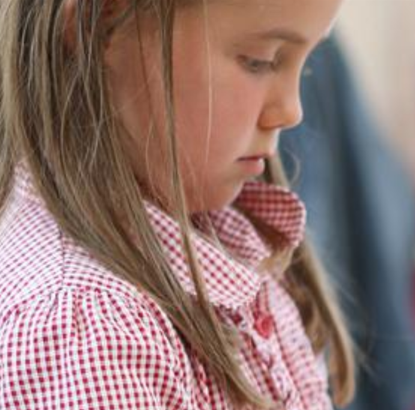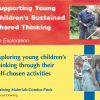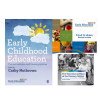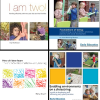Letter to the next Prime Minister
The letter below sets out our key asks for the next government.
by Katherine Gulliver
Early Education was recently asked to review the special educational needs and/or disabilities (SEND) provision in the early years within one local authority, and this article picks out some findings which are of national significance in relation to inclusion in the Reception year.
The early years has a rich history of play-based, child-centred practice, which lends itself to an inclusive curriculum that values every child as unique (DfE, 2021). Because the Reception year in England is part of the early years foundation stage (EYFS), it should be accessible to any child. The EYFS uses a strength-based view of children, which can help to position children with SEND away from the traditional deficit model that focusses on what they cannot do in comparison to “typically developing” peers (Gulliver, 2023). Furthermore, the EYFS promotes a relational, pedagogic approach where practitioners are able to watch closely and build a responsive relationship with children, by tuning into children’s own learning paces and priorities (Clark, 2022).
However, top-down pressure from schools can create a culture that priorities formal learning, especially in Reception. Despite the inclusive nature of early years, a recent study from the London School of Economics found that increasing numbers of pupils with SEND were missing some or all of reception and joining school in Year 1 (Martin, 2023).
Inclusive pedagogies that embrace child-centred practice would help support children’s transition between different settings, however, research suggests formal instruction and less developmentally appropriate environments are often found in Reception classes (Bradbury, 2019). This can impact children with SEND in particular, who may have fewer opportunities than their peers to be able to participate and achieve (Georgeson, Adams, Short & Ullman, 2023).
A Reception class teacher we interviewed recently removed all the tables in their classroom. They describe the differences in creating an enabling environment through continuous provision which provides multiple opportunities for children to explore and learn at their own pace.
“We expected children to fit this certain mould and they weren’t going to. And actually, forcing them to fill in a worksheet when they still need to work on their fine motor skills is just stressful for them. That’s not an inclusive classroom. That’s actually putting barriers in the way of their enjoyment of learning. They need to love learning first. And they learn to love learning through their play first.”
– Reception teacher
In contrast to focussing on children being “ready” for school, early years pedagogy recognises children’s own preferences and priorities, meets them at their pace and ensures the school is ready for the child.
“[it is] Important not to be taking children out of class, [but] to be bringing the intervention to them in the spaces that they create for themselves where they choose to learn. You know, if a child’s at a water tray for the majority of the time, there’s a reason why they’re there…”
– Reception teacher
Competing tensions occur from external pressures on early years providers to produce data which evidence progress, echoing the particularly intensive data driven management of teachers and schools in England (Wilkins, 2015). This is particularly troubling for inclusion when schools are measured on academic achievement instead of equitable provision for all children.
The reception baseline assessments influence teachers to use more formal instruction rather than creative, play-based approaches (Early Excellence, 2017). This “schoolification” of the early years is especially worrying as formal schooling approaches similar to Year 1 begins to creep into Reception classes (Bradbury, 2019), and move away from practice centred around children’s individual learning pace.
“The learning was very directed, very planned and sequenced. And children were basically kind of directed to do an activity in a certain set way. For example, completing worksheets and doing writing tasks when perhaps they weren’t ready […] so we really felt we had to do something to meet children where they were rather than for them to fit our own agenda.”
– Reception teacher
The evidence makes a strong case for a play-based, relational pedagogic approach in the reception year as being the most effective for long term attainment and life success for children. It also reveals that this approach may also be highly effective for cognitive as well as non-cognitive aspects of learning, both of which are increasingly acknowledged as being critical for succeeding in life. This approach may be more effective for less advantaged children, who often lack opportunities for such experiences (Pascal et al, 2017).
Where Reception does maintain a “hybrid pedagogy” there are then concerns about the formal nature of education in Year 1. Pascal et al note that:
“a fundamental problem in England is the discontinuity between the EYFS and the Key Stage 1 curriculum and its associated pedagogy. This is something Fisher’s (2009; 2011) two studies recognise, and she urges that there is a need to re-think children’s educational experiences in English early years classrooms because of the identified discontinuity between the play-based and child-initiated EYFS curriculum and the more structured adult-led primary curriculum”. (Pascal et al, 2019:21).
Families and schools looking at including a child with SEND may well be looking ahead and deciding that even if they are able to be inclusive in the EYFS, this could break down in Year 1 and beyond, raising huge concerns over the tensions between inclusion and formal learning.
Settings without the knowledge and experience of supporting children and families with SEND may appear as exclusive or unsupportive, leaving families frustrated and isolated. On the other hand, the EYFS provides the building blocks for a responsive pedagogy focussed on child-centred support that recognises children’s learning priorities and paces in a way which works for them and their development.
Research highlights the importance of creating a supportive learning environment for young children with SEND (Gulliver, 2023). This involves providing resources and materials that cater to diverse learning needs and styles, “to support learners in the multiple ways that they prefer to learn” (Reception teacher). The EYFS is a good opportunity for practitioners to view SEND support as inclusive, child-centred practice that benefits all children. For example, using child-centred principles (see the Child-Centred Competences e-book) such as a strength-based view of a child who is capable and competent, which includes understanding responsive communication rather than behaviour. Following these principles should enable every child to have their needs met in any setting, and this should be even more evident in Reception classes across England. The early years celebrates diversity in a way that values the whole child. How the EYFS is implemented in Reception classes can be pivotal to the successful inclusion and support for children with SEND.
Dr Katherine Gulliver is a Lecturer and researcher at Plymouth Institute of Education.
Join one of our courses to improve your knowledge of SEND, inclusive practice and other aspects of early years pedagogy.
Browse upcoming coursesBook support from our expert team of Associates for tailored training and support you to review and improve practice.
Find out moreBradbury, A. (2019). “Datafied at four: the role of data in the ‘schoolification’ of early childhood education in England” in Learning, Media and Technology, 44 (1), pp. 7-21
Clark, A. (2022). Slow knowledge and the unhurried child: time for slow pedagogies in early childhood education. Taylor & Francis.
Department for Education (2021). Statutory framework for the early years foundation stage: setting the standards for learning, development and care for children from birth to five.
Georgeson, J., Adams, H., Short, E. and Ullman, K. (2023). Inclusive education for young children with special educational needs and disabilities (SEND): Multiple perspectives. In Early Childhood Education Current realities and future priorities. London: Sage, pp. 83–94.
Martin, M. (2023). Send: ‘concern’ as primary late starters double, Tes Magazine. Available at: https://www.tes.com/magazine/news/primary/send-concern-primary-late-starters-double (Accessed: 04 October 2023).
Gulliver, K. (2023) Children with Williams Syndrome: Experiences of mainstream primary schools. Doctoral dissertation, University of Plymouth. https://dx.doi.org/10.24382/5061
Pascal, C., Bertram, T. and Rouse, L. (2019) Getting it right in the Early Years Foundation Stage: a review of the evidence. Centre for Research in Early Childhood. Available at: https://early-education.org.uk/wp-content/uploads/2021/12/Getting-it-right-in-the-EYFS-Literature-Review.pdf

The letter below sets out our key asks for the next government.
Early Education Associate, Debi Keyte-Hartland reflects on a recent commission by Balcarras Teaching School Hub In Gloucestershire to deliver a four-day course on Sustained Shared
DfE have issued an update to address the issue of parents wishing to claim their codes for the new entitlements who cannot do so because
Guest blog by Frances Giampapa and Claire Lee Introduction A wealth of evidence demonstrates the fundamental role played by early years (EY) education in shaping
UK early years curricula England The Early Years Foundation Stage statutory framework applies in England for early years provision for children from birth to 5.
The Department for Education has today published the two versions of the EYFS Statutory Framework which will apply from 4 January 2024: These incorporate the
The Department for Education has today published its response to the EYFS consultation conducted in the summer. The changes will be implemented from January 2024
Clare Devlin, Early Education Associate What aspects of physical development should we focus on within the Early Years Foundation Stage (EYFS) and other early years
By Debi Keyte-Hartland, Early Education Associate This article is based on one included in the Early Education Journal no 100. To access the full article
In this article, Kate Irvine from Bristol Early Years discusses the impact of practitioners engaging in a sustained process of CPD through cluster groups and
by Dr Jo Albin-Clark, Edge Hill University and Dr Nathan Archer, Leeds Beckett University Inspection in the news Being involved in education in England involves
The Department for Education (DfE) have published their response to the consultation on potential changes to staff:child ratios. The consultation received responses from nearly 10,000
What are “Fundamental British Values”? by Vicky Hutchin The so-called “Fundamental British Values” form a part of the Prevent Duty, introduced in 2015 and last
The open letter below was sent to Ofsted in November 2023. Download Ofsted’s response We the undersigned are writing to you about the recently published
by Clarissa Frigerio Why are there so few men teaching in the early years? I have worked in the profession for almost 9 years, and
Early childhood education today has been influenced by key figures such as Froebel, Montessori, Isaacs and MacMillan. Much recent research has supported their ideas although
We deplore the recent article by The Telegraph which singled out Liz Pemberton for criticism of her anti-racism training, which she has delivered for many
Sustained shared thinking: An episode in which two or more individuals “work together” in an intellectual way to solve a problem, clarify a concept, evaluate
Early years pedagogy is the theory that informs the practice of teaching children in the early years. The pedagogical research has been carried out by
by Cathy Gunning What is reflective practice? Reading a book by Donald Schon early on in my career as a teacher opened my eyes to
The Early Career Framework has been designed by the Department for Education in England to support newly qualified teachers in England with a structured package of support
The following extracts from past early years teaching newsletters have a feature which supports your team dialogue around pedagogy and practice dilemmas and reflective practice.
Last updated Spring 2018. The preschools of the Reggio Emilia in Northern Italy inspire us with their pedagogy and practice in giving children rich encounters
In most cases, sound early years principles and practices are already in place in settings. The EYPP funding allows settings to review and refine what
Who was Friedrich Froebel (1782-1852) Born on 21 April 1782 Friedrich Froebel was a German educator who invented the kindergarten. He believed that “play is
This article by Early Education Associate Anni McTavish explores the term “cultural capital”, and what it might mean for early years practitioners and their settings.
Welcome to the e-book Child-Centred Competences for Early Childhood Education and Care. The book brings together four years of research undertaken by early childhood academics
Introduction Race and racism in society is as important as ever; I am writing not only as a British South Asian who has experienced racism,
Raymond Williams maintained, after years of examining constructs of culture and society that “Culture is one of the two or three most complicated words in






Early Education
2 Victoria Square
St Albans
AL1 3TF
T: 01727 884925
E: office@early-education.org.uk